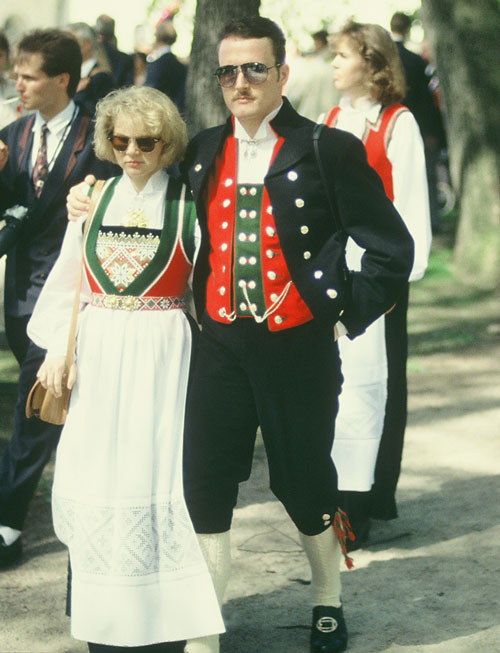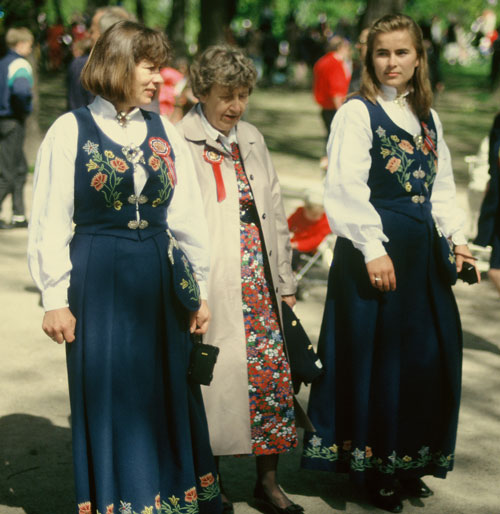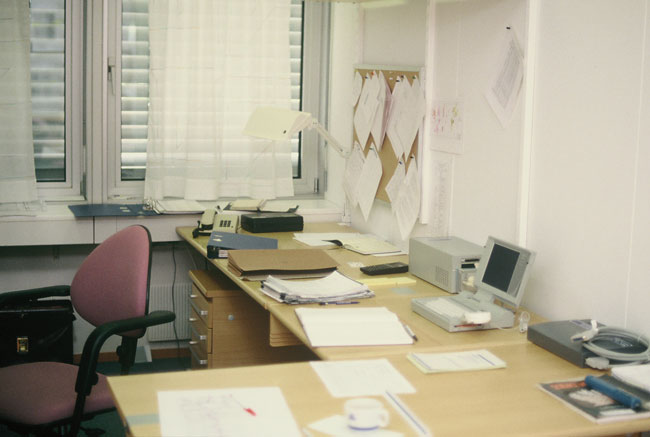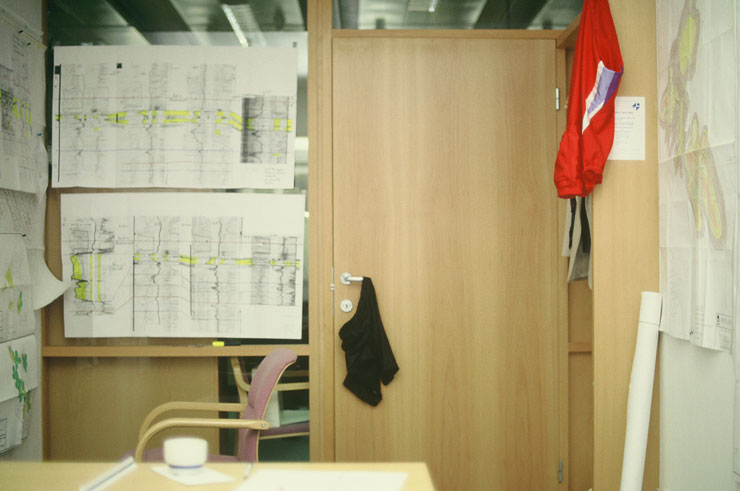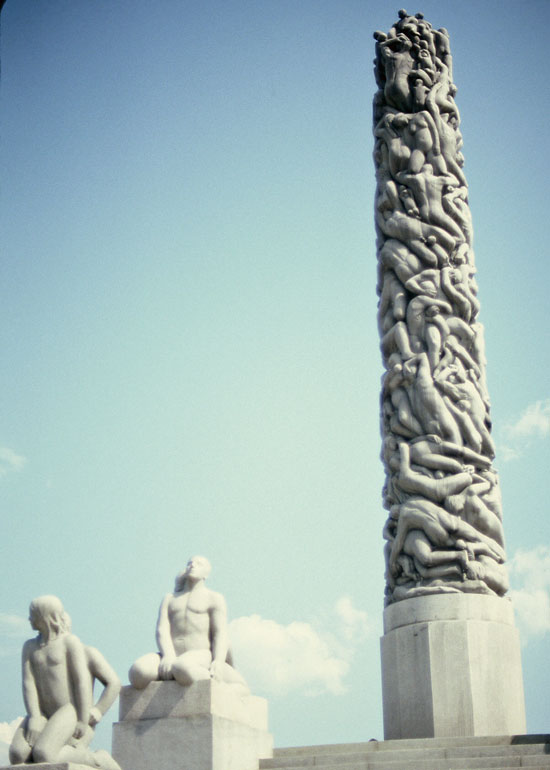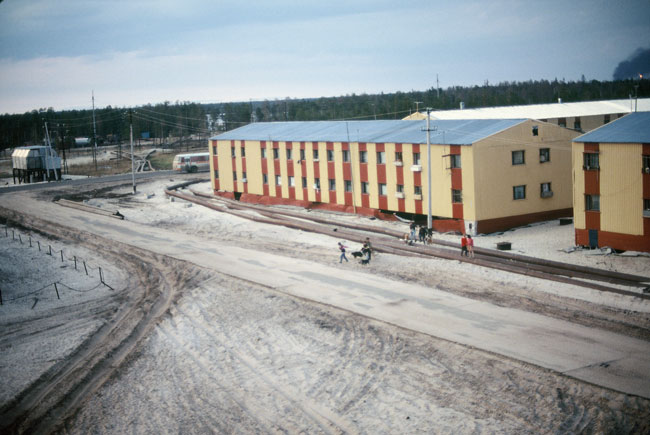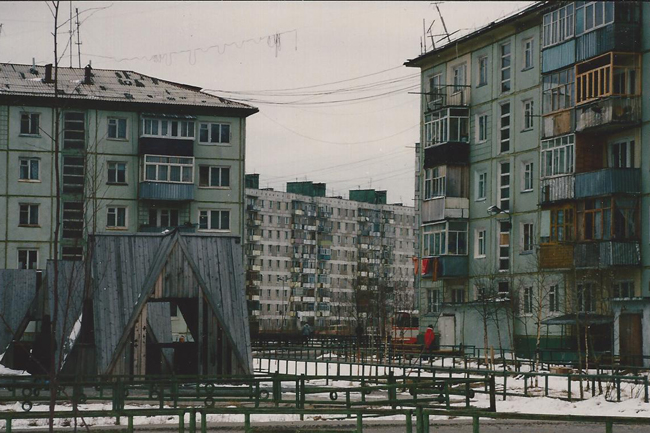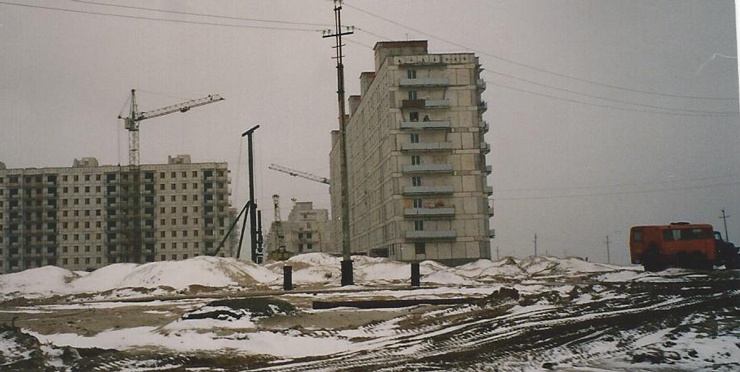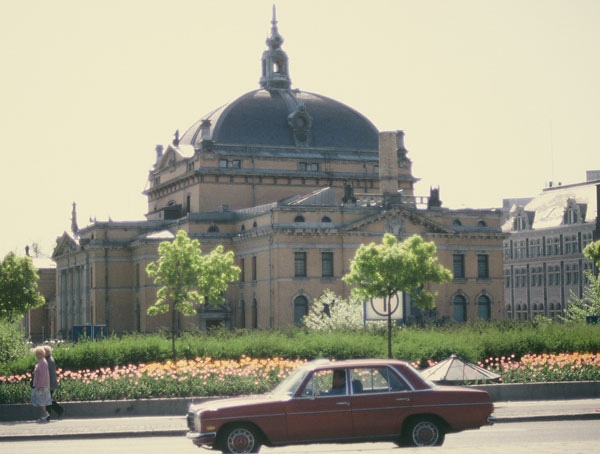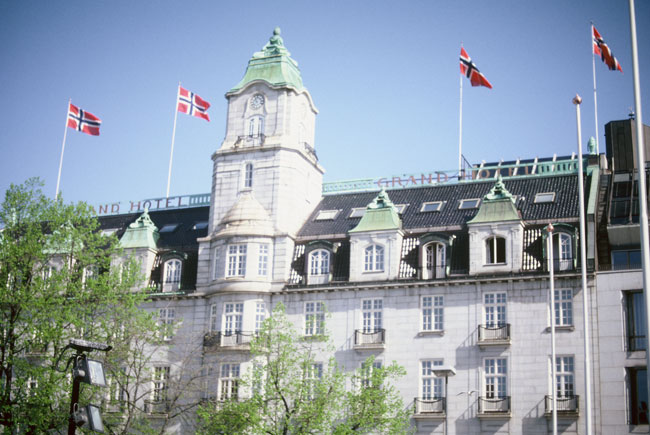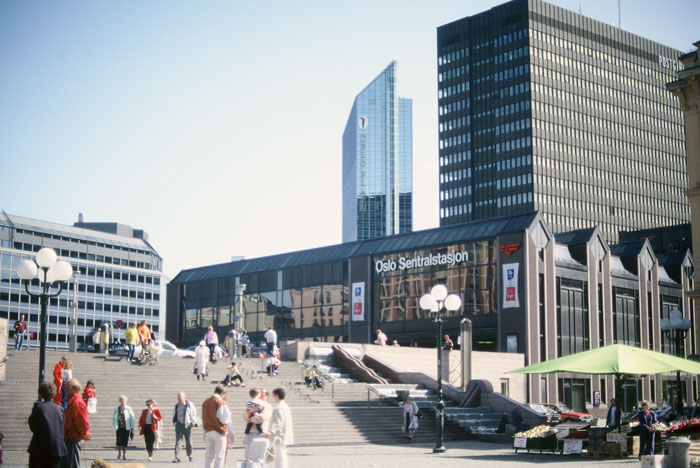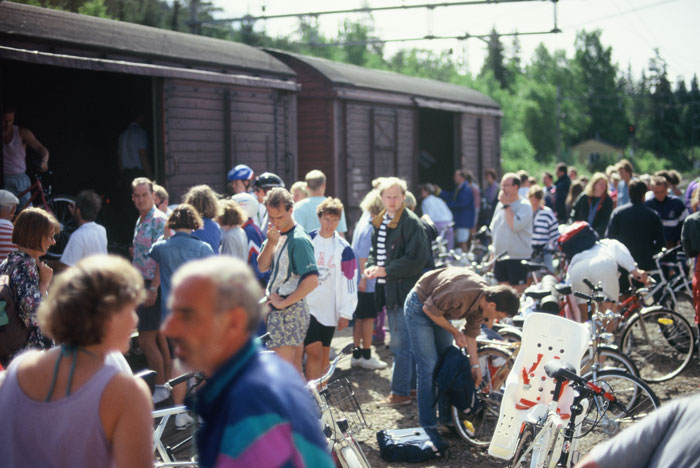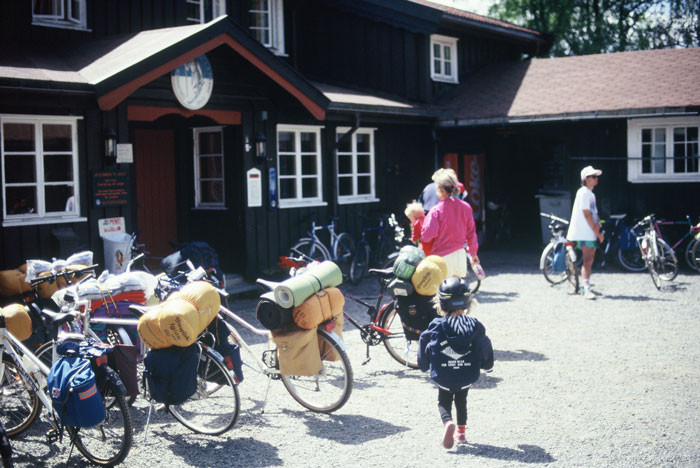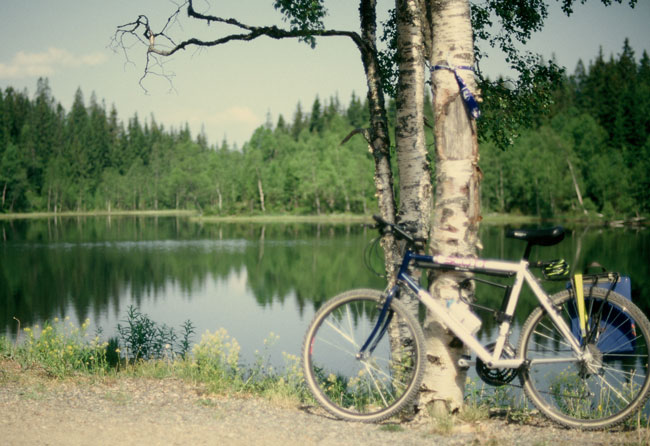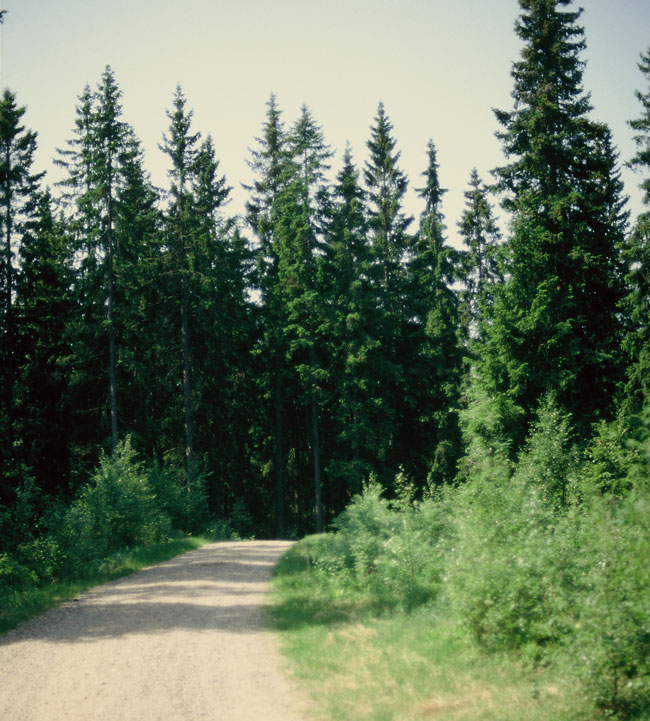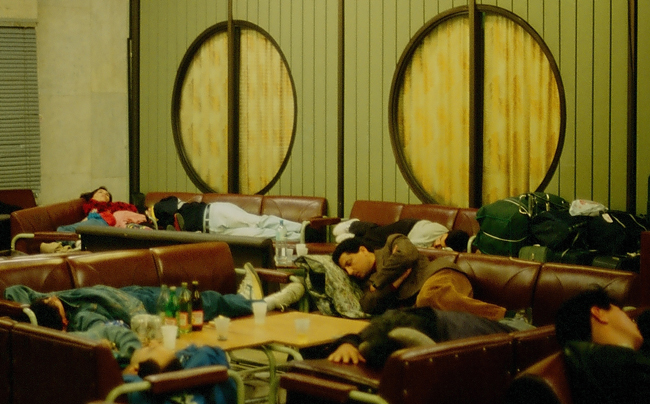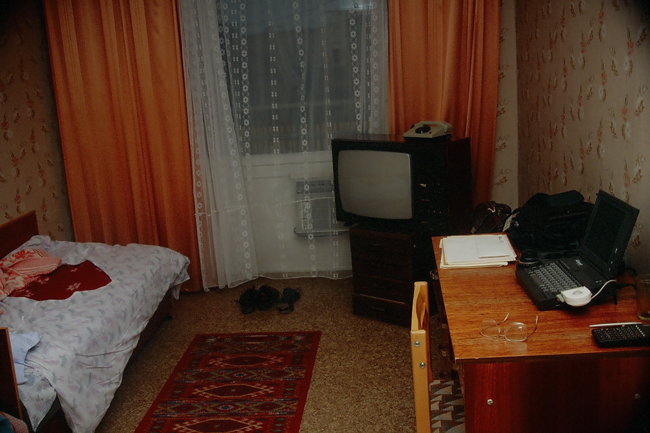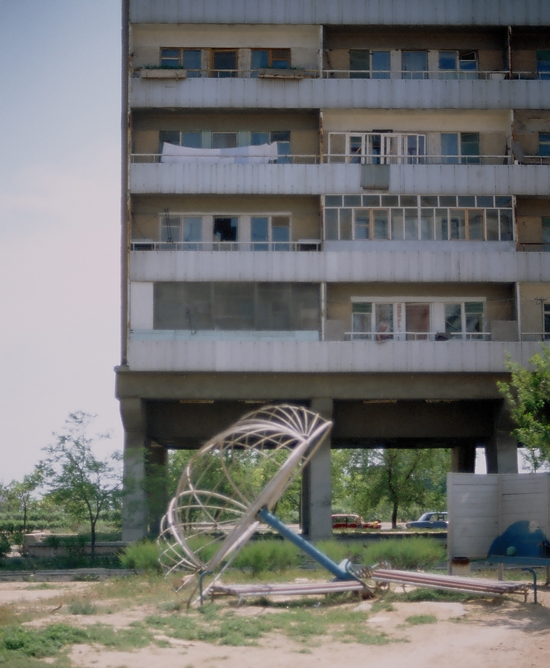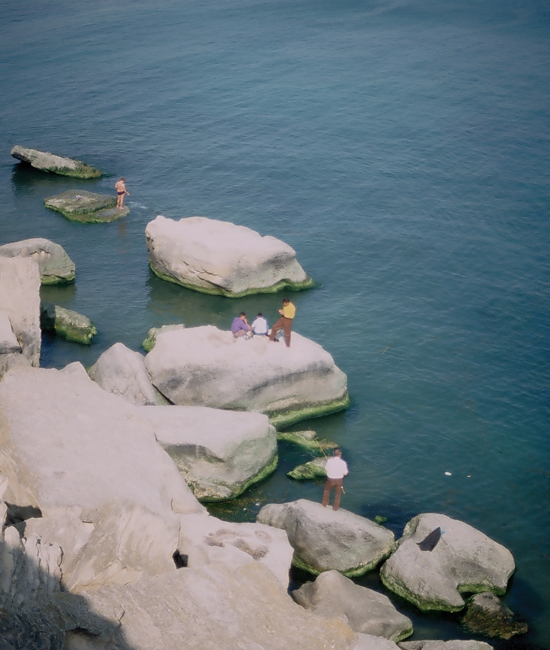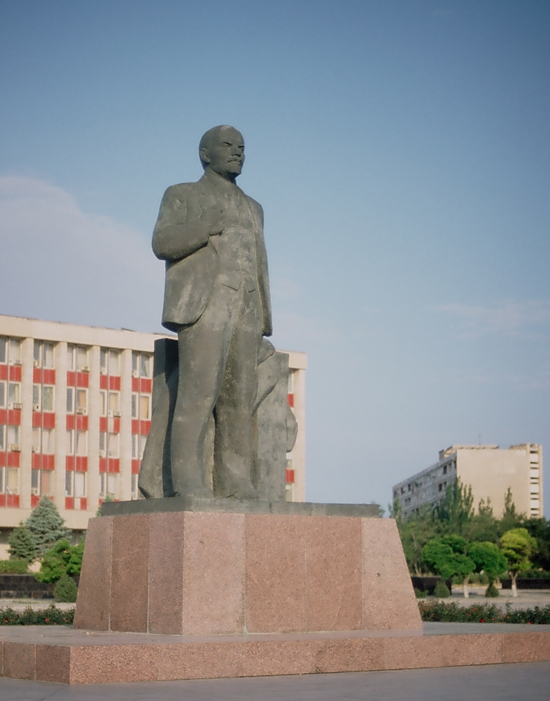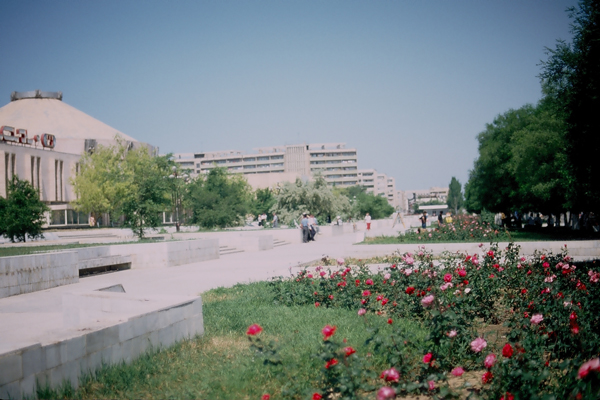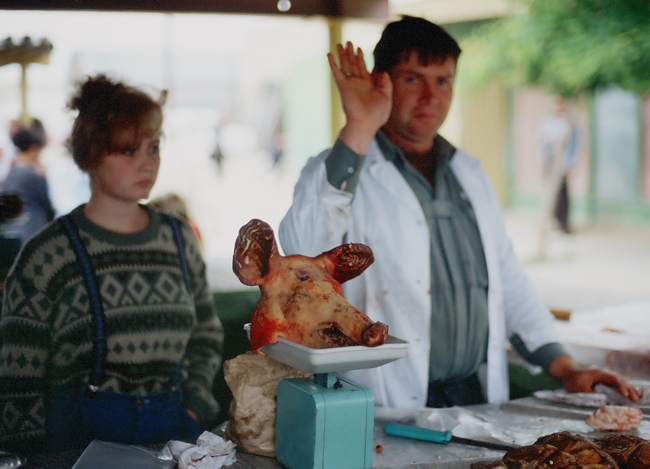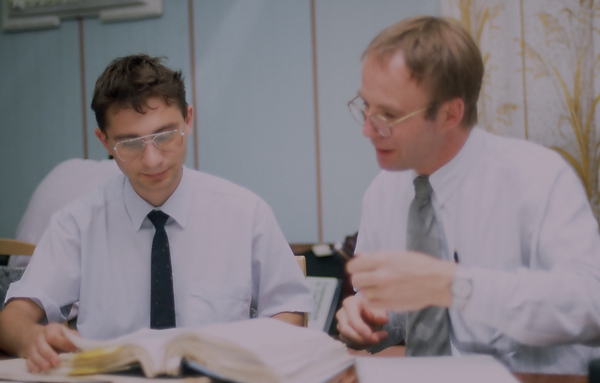|
In early May, 1992, Questa Engineering signed a contract with Norsk Hydro to provide a geologist to study the White Knights Venture oil fields in Siberia, and I signed an Independent Contractor's Agreement with Questa. I packed my bags and headed to Oslo for what was expected to be a two-month assignment (I had a two-month work visa from Norway). During the assignment would be a 10-day trip to Raduzhney, Russia, to gather more data for the study. The following pages are my journal from the Oslo and Raduzhney assignment.
May 12, 1992
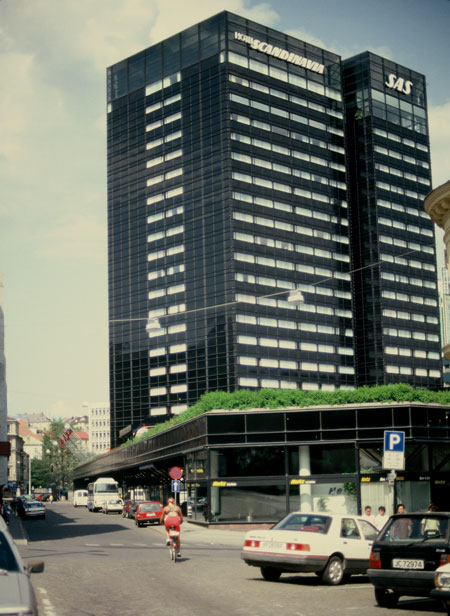 SAS Hotel in downtown Oslo where I stayed for several weeks.
I was introduced to the projects today and there’s a huge amount of work to be done. I'll make three maps before Friday regarding the Golden Mammoth Project. On Monday we depart for Raduzhney to gather data to evaluate the White Nights Project. Anglo Suisse and Fibro are attempting to farmout part of their interests to Norsk Hydro and are putting the heat on them to complete their evaluation before the end of June. They have far more to do than can be completed in that time with their current staffing. I need to fly back to Denver for Lance's BEA Project deposition during the first week of June: that went over like a lead balloon! Hopefully the project will be settled out of court and I'll not have to abandon these folks. Clearly they need more experienced help like me. They really need Jack too, but it probably is too late to get him here now. Based on my quick look at the NK field, the current analysis seems shockingly simplistic. I really could use a technician to speed up my job, but I'm told that will be difficult. I need to finish this now and work on Lance's coal-bed methane project before midnight so I can discuss it with him tomorrow afternoon.
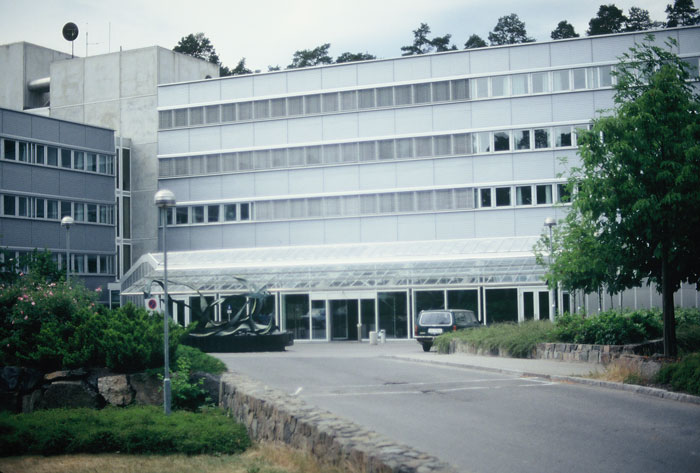 Norsk Hydro office building just outside Oslo.
May 16, 1992
After work Friday, I went to a bike shop and bought a Scott Mountain bike for 4500 Kroner, plus another 500 Kroner for frills like a rack, bike pack, water bottle, lock, and elastic cords. I rode home in my suit with by brief case stuffed in the bike pack. I went back to the hotel and changed, then rode around the local area. Today I rode all day. I went up the Holenkollen, which is the highest point around. The Norwegians constructed a huge ski jump there out of cement. It's quite spectacular with cement steps all around for spectators to sit and watch the jumpers. I rode back to the hotel by a rather tortuous route that must have resembled a snail traversing a garden. You see, the roads wind aimlessly around this hilly city and it's quite easy be become disoriented. When all else fails, go downhill until you find the coast. From there you generally can find a landmark that you remember well enough to navigate back to the hotel. This city is very special. The quality of life is the best I think I ever have seen. The people are quite friendly and all speak some English. The buildings and houses are neat and well-constructed. Many structures have red tile roofs which gives the city a nice presentation. It's located in a hilly area on the south coast, so the views are spectacular. There are bike lanes and bike trails everywhere. Before departing for Oslo, Kevin told me he couldn't remember whether Oslo was the best or the worst city for cycling. I can answer that now: it is the best! I found a cobbler this morning to repair my dress shoes. Then I found a cleaners to do my laundry cheaper than the hotel. Finally I located a tailor to hem my slacks. Upon returning from Russia, my hotel room will be in good order.
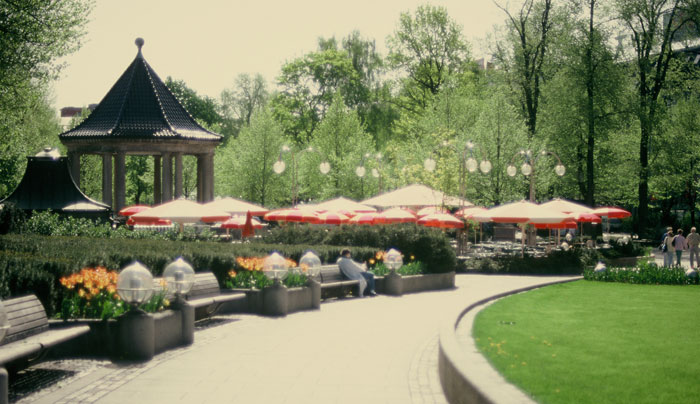 This is the cafe where I ate often. Norwegians have a fetish for dogs. Clearly the city has no leash law because dogs seem to run freely. The dogs generally are large: German Sheppard's, Labrador, and standard Poodles are most common. There's this Rudd Goldberg devise used the Norwegians that fastens to a bicycle frame and is a spring loaded dog leash for running a dog along-side a bicycle. There's one more thing I'll briefly describe before ending this day's entry. Based on the statues and art forms I've seen, it seems the Norwegians have strong family values. I've taken many photos of statues of nude buxom women with young children. Often the women are be larger than life and muscular. It seems there are significantly more young ladies than young men here. The Norwegians are attractive people, but smoke far too much.
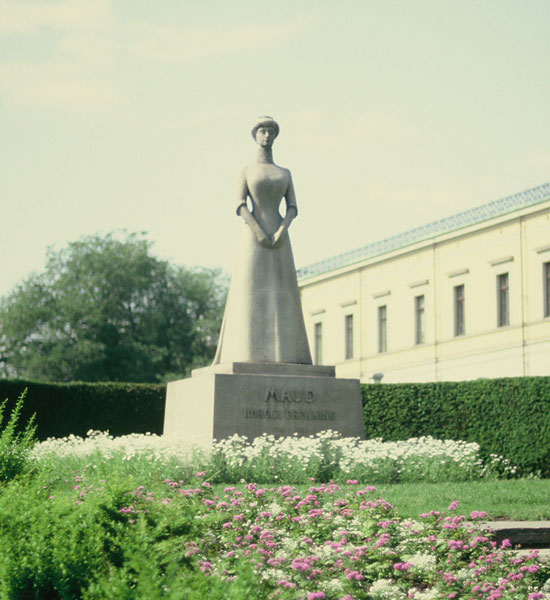
May 18, 1992
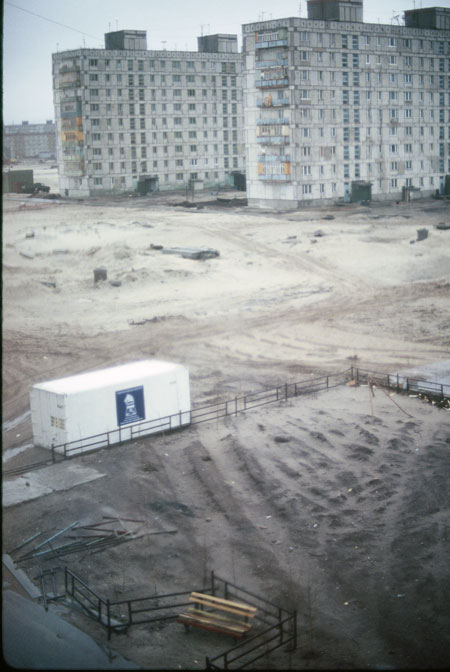 Beautiful downtown Raduzhney, western Siberia.
May 20, 1992
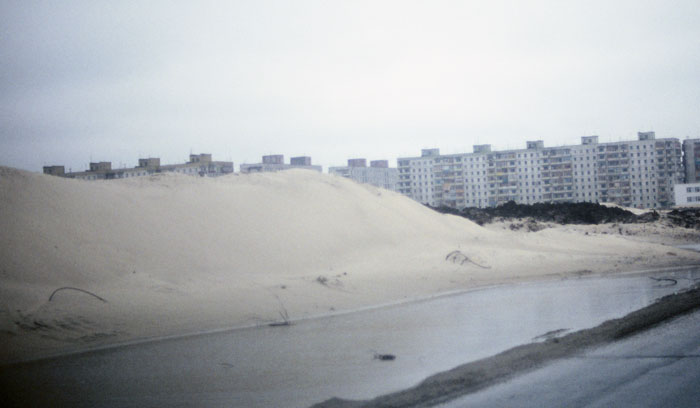 Sand dunes in the Raduzhney area.
We spent today copying data and it appears our Saturday deadline is quite optimistic. There are over 400 wells in one field, and 150 in the other. We'll attempt to gather what's possible, but recognize the project deadline in late June will not change. Thus time spent gathering data is time not spent analyzing the data. Tough call. There are four of us gathering data and our days are long. We eat at the Plaza which is a building owned by White Nights. The dining room is in the “dungeon” which is a medieval styled rock-walled basement with a “long table” and images of a rooks here and there. The food is ok, but not great. Unfortunately it can take 30 minutes to drive from the Plaza to the office because of the unbelievably bad roads. As I mentioned earlier, they're constructed simply by laying a double row of 6-inch concrete slabs on the sand. With the endless lines of very heavy rough-terrain vehicles traveling over them, they're quite warn. In places, pieces of “rebar” stick high out of the concrete and must ruin tires and vehicles. Tomorrow we'll attempt once again to commandeer a 4-door Russian jeep for our use during this visit. While I'm anxious to drive a Russian jeep in Siberia, I'm secretly concerned I'll not be able to find my way around. It's so flat and the buildings are all so similar and there's so much commotion, I may be chronically disoriented. It's nearly midnight now and I must retire so that I'm rested for another busy day tomorrow.
May 21, 1992
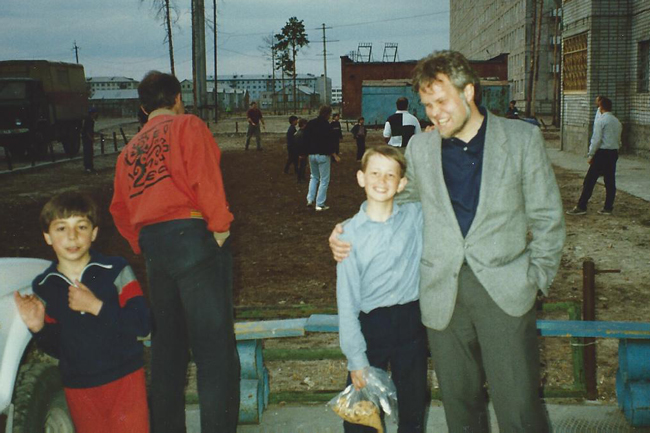 Kola is the boy to the right, Raduzhney. Data gathering went well today and I'm well on my way to copying all of the ‘research’ wells (wells drilled before production begins which delineate the fields). The development wells gather only limited data and are not of much use in evaluating original-oil-in-place (OOIP). West Varyegan has only about 25 research wells, but there are more than 150 production wells. It would be impossible to evaluate all the development wells in the time frame of this project. Even limiting our evaluation to the research wells is an optimistic goal in our three-week time-frame.
May 23, 1992
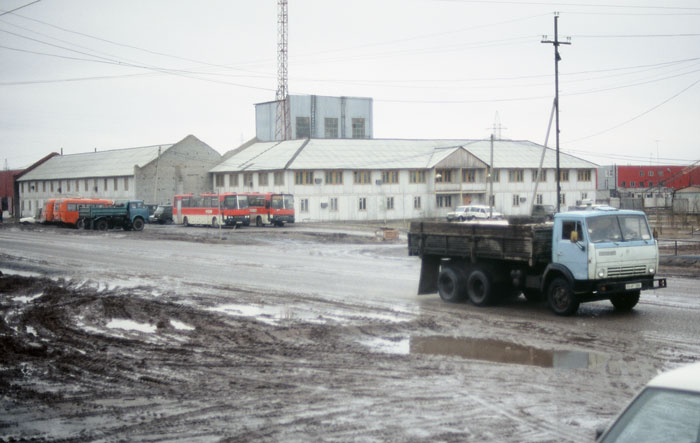
Raduzhney is quite a remarkable city. Built in a meandering river plain on arctic sand dunes, logistics are sometimes almost insurmountable. The apartments are quite rough and constructed of concrete. There is no apparent concern for aesthetic appeal. They were constructed only to house the 50,000 oil-field people of Raduzhney. And these Siberians are here for only one reason: because the Soviets needed people to produce these tremendous oil reserves. The workers now are discontent since they are behind up to nine months on their pay. The bank is short of rubles and will not allow withdrawals of more than 3,000 rubles at a time. They have instituted a new system however which allows people to write ‘checks’ for the missing rubles. Raduzhney is a tribute to Russian ingenuity and perseverance. Kola came to the Plaza last night and sat with me while we played cards. The kids are not allowed in the Plaza, apparently because there has been a lot of theft from the cars. Kola somehow sneaks in and out at will. He brought with him several inexpensive Siberian souvenirs which he sold for about $10 total. It was fun to watch him try to negotiate and it was apparent he was quite new at it. Svein wanted to buy a matruska and was willing to pay $5 for it. Since Svein had no dollars, I ask him if he minded me negotiating with Kola for the sale. I was tough trading the boy and Svein thought perhaps I was too tough. I told him I didn't mind giving him all the money, but I wanted to teach him a little about free enterprise. Could it be that someday this slight young boy will be a leader of Russia: one never knows. Surely he is bright enough to become a leader. And he has the energy and social skills necessary to lead. I really enjoy the boy and already miss him. Communication is very difficult and we make gestures and draw pictures in order to express thoughts. He was thrilled with the Horner Marine Band harmonica I gave him, especially after I played Camp Town Races and Oh Suzanna for him. I also gave him a bag of rubber bands, pads of paper and pens, and a pair of wool gloves. He was in heaven when I let him count the $250 in my wallet!
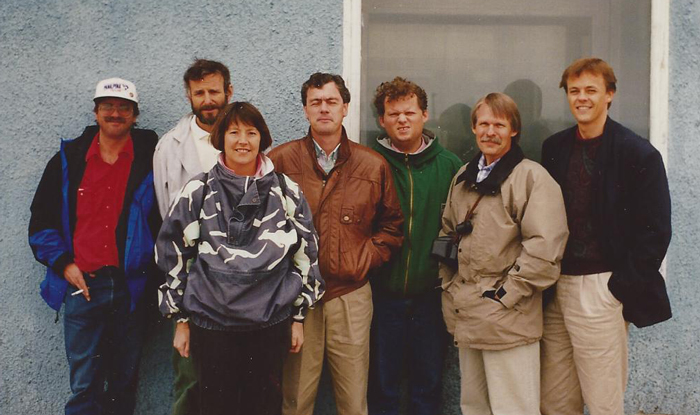 Mike Van Poolen, Harm, Alyson Harding, Mike Adams, Eirik, Bill Connelly, Svein Lein, in Raduzhney. Van Poolen died in Siberia later that summer from tequila overdose. I began this day searching for my lost camera. I last saw it when we were in the Ford 4-wheel drive pick-up truck. The truck stalled and the Russian driver could not figure out what was wrong, so I got out in the snowstorm to help him. I climbed into the driver's seat and put the truck in gear, but the transmission would not engage. When I opened the hood to investigate, I discovered several major problems. First I noticed the belt running the alternator and power brakes was uselessly loose; moreover, it did not wrap around the power brake pulley. We tried in vain in the freezing cold to fix the belt, but it turned out the belt was not the correct size. Apparently someone had replaced the original belt with a smaller one, so they did not run it across the power brake pulley. Next, the transmission fluid did not register on the dip stick. We added one quart of fluid, but it still did not register. Mind you, this truck had only 13,000 miles on it and was one of a very small fleet of Ford trucks transported to this remote region. In the end we left the driver with the inoperable truck and took the Varyegan Neftegaz bus to the Plaza. After dropping off our briefcases and computers at the front desk, we climbed into an overcrowded Pajaro jeep and went to the dormitory to gather our belongings and check out. When I went to my room, I found that the house lady completely unpacked by belongings for me. It was very nice of her, but now I had to pack them all up again and leave. I left her a dollar on the dresser. Upon arriving back at the Plaza and moving into my new more luxurious quarters (though still quite modest), I noticed my camera missing. I looked for it in all the obvious places, but to no avail. I went to bed with the hope I had left it at the office and would pick it up in the morning. But the next day it was not in the office. I surmised it must be in the Ford truck, but thought the chances of ever seeing it again were nil. The worst thing about it was that all of my photos of Raduzhney and Moscow were in the camera and in the spare film case with the camera. This morning we went to the transportation headquarters to where the Ford was towed for repair pursuing the long-shot that the camera was still in the truck. The driver was there with the truck and managed to communicate to us that the camera was in his apartment. We drove to the apartment across the worse imaginable roads and retrieved the camera. I gave as a reward to the Russian man the gold cross pen Eddie Wong gave to me; he was reluctant to accept it, but was quite excited about the gift. Just now I'm flying on SAS from Moscow to Stockholm. Our flight on Aeroflot from Raduzhney to Moscow was smooth and enjoyable. It was a charter flight and cost Hydro $4,000. A commercial flight would have cost us 450 rubles each, or $4.50; there were seven people in our group. We rode in a separate front cabin with large chairs and a table. The crew let us go into the cockpit and sit at the copilot’s chair. We even went up into the glass nose cone and visited with the navigator. I was shocked to find the navigator using visual techniques to navigate, and a slide rule to do his computations! The Russians a wonderful people and will do anything to please you.
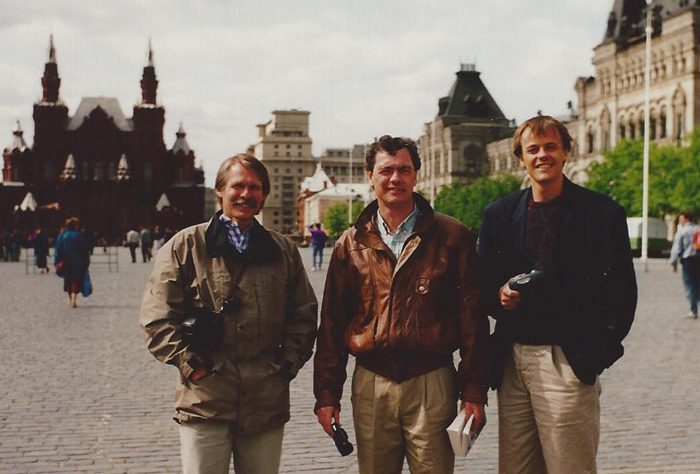 Bill Connelly, Mike Adams, and Svein Lein in Red Square, Moscow. Upon landing at the southwest airport in Moscow, the Norsk Hydro employees were not there to greet us. We waited on the tarmac for two hours before the group could make a decision of what to do next. I went with Mike Adams out in front of the airport and found a van-taxi and had it drive around back to pick up the group. We were greeted by Holm in something of a rage that we took the initiative to find a taxi. I was surprised he was being so bold and behaving as though he was the leader, but did not question him. Instead I gave the taxi a buck and told him there was a misunderstanding and that we did not need a taxi. Mind you, I just negotiated the cab fare down to $50 from $100 after a tortuous discussion in Russian. But what the heck: I was there to have fun and see the world, not fuss about a cab. So we sat on the tarmac for another hour before Holm decided to get a taxi. Only difference was that Helm's taxi cost him $100! The taxi drove through central Moscow on the way from the SW airport to the international airport NW of town. We went to Red Square and had a full 12-minutes to walk around. It was sunny and warm and Red Square was quite brilliant. I bought a political matruska and a Soviet military hat for $10 and climbed back into the taxi, followed by a dozen pushy vendors in a feeding frenzy.
May 25, 1992
It's 6:25AM now and I must leave for work. This will be my first ride to work on a workday, so I want to leave early. I timed the ride yesterday and it took 25 minutes; since I was there anyway, I dropped off my brief case with the guards.
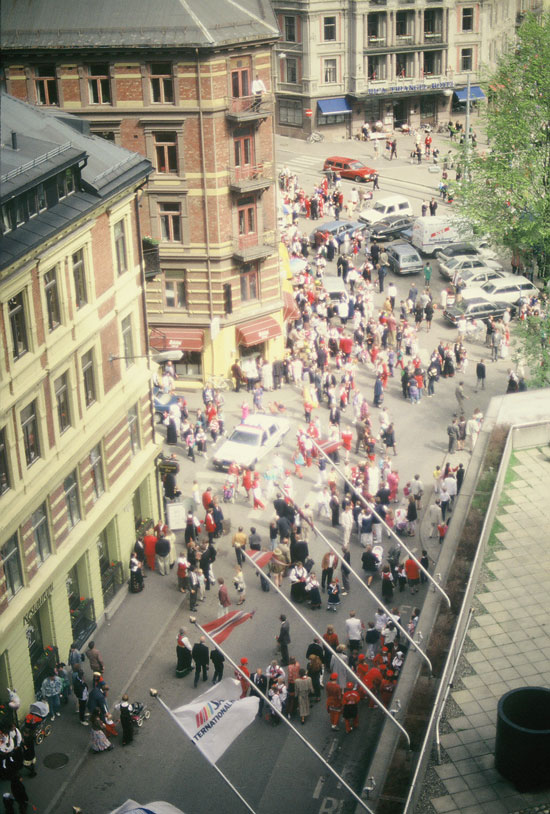 View from my new room at Triangle Hotel.
May 26, 1992
Work is going well, although it's quite busy. I’ve built several spreadsheets to attempt to get my arms around the data and the Norwegians are impressed with my spreadsheet skills: they haven't seen anything yet. I'm working 12-hour days to get a jump on the project before leaving for the States. I'll miss two days’ work and I feel guilty. They are going to ask me to work more on the Golden Mammoth project before Friday so they can prepare for an upcoming trip to Moscow. I have no idea how I'm to slip in the Golden Mammoth project with the already impossible deadlines. I'll save some computer work for the airplane trip since I'll have many hours in the plane. Besides, I should be able to charge a day of my travel time to the project and help offset the $3500 ticket. It’s 22:00 at night now and the sun just set. The air is warm and smells of fresh flowers which are blooming all over town. There's a constant background of city sounds, but they are not objectionable. My new apartment is working out well and costs only a third of the room at SAS. Mike Adams moved into the room next door to me today but I've not seen him here yet. I think he goes to a pub at night for a few beers. I generally ride straight home from work and change into more comfortable cloths, then go back out and peddle around the neighborhood. I still haven't found a good place to eat; today I did manage to find a Burger King and ordered a fish sandwich. Things are prohibitively expensive here. My laundry yesterday cost me $50; Mike told me his cost over $100! I'm leaving a note for the cleaning lady offering to hire her to wash my cloths and run a couple errands for me during the day. Stores are open between 09:00 and 17:00, so I have not been able to pick up me shoes from the cobbler, my laundry from the cleaners, or my trousers from the tailor.
May 28, 1992
I rode to the office after lunch to drop off some materials and to pick up other materials since I only can carry so much on the bike. I stopped by Bygdoy beach and half of Norway was there. I didn't know it's common for Norwegian women to sunbathe topless. That certainly adds a new dimension to beach going! Every day I ride to a new part of town and am awed by the beautiful old structures and statues. There's so much history and culture here compared to most places I've been.
May 30, 1992
May 31, 1992
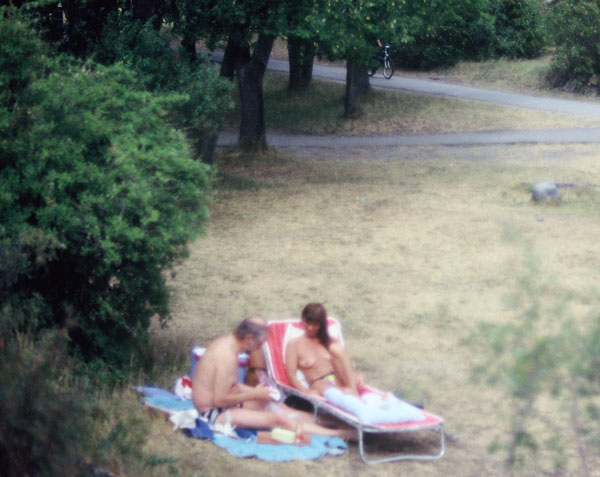
We had a beer at the local pub on the beach and continued our ride around the peninsula. The place is very exclusive and the homes are beautiful. I saw only one home with rhododendrons, though there were many lilacs, tulips, and other flowers. We rode past a maritime museum where they had on display a 100-year-old clipper-type ship specially built to sail to the north pole. Apparently they specially designed this ship's haul to withstand freezing. They allowed it to freeze into the ocean in hopes it would float closer to the north pole. It took three years for this bold effort, and in the end it failed. The haul is built with a rounded configuration so that it would be pushed up out of the water/ice like a watermelon seed as the water froze around it. We went past a building containing a 1000-year-old Viking ship, but did not stop to see it; I'll go back another day. Last night Mike and I went to a dinner party hosted by Allison Harding. There were many guests from Hydro and I enjoyed meeting these people. I spent hours talking with a gentleman who turned out to be Hydro's lead man on their Russian ventures. He has been active in Russia for three years now and had many very interesting stories. He heard that I was working on the White Nights project and that I was knowledgeable about Russian logs. We hit it off good and I'll take his invitation and visit him in his office next week. Just now I'll jump on my bike and ride up the Lysakerlsa River along a bike path. I need to go to work at noon and I think I'll have plenty of time to make the trip beforehand. The weather continues to be in the 80's and there's not a cloud in the sky.
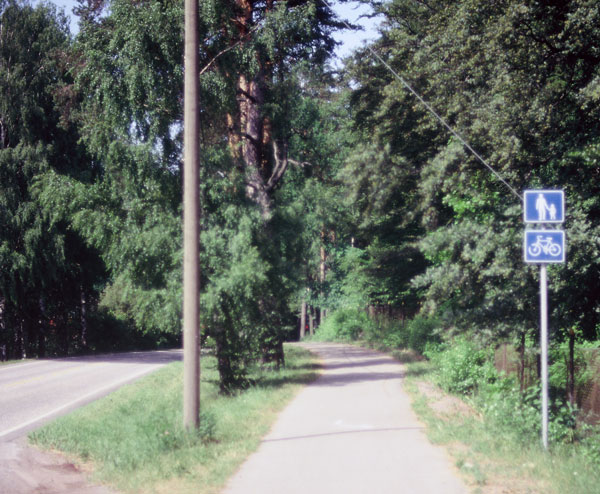
June 3, 1992
On Monday I received a FAX from Lance's office telling me the deposition we scheduled for Wednesday 6/10/92. Making a trip to Denver for a Wednesday meeting would take the entire week, which would put a strain on this project for Norsk Hydro, plus would cost me considerable money in travel expense and lost work time. I called and explained I would try to make the deposition, but that I requested to have it on a Monday so that I could travel on the weekend. Thirty minutes later I received another FAX canceling the 6/10/92 meeting. I feel very awkward about this whole matter because I'm letting Lance down. I hope it works out to everyone's advantage in the end. I have one more cross-section to build on the B10 sand at West Varyegan Field and should complete it before lunch today. I'm anxious to start making gross sand isopach maps and net pay maps and determine the correct volumetrics. My technician will begin building tables for me this morning so that I can blast into the mapping at warp speed.
June 6, 1992
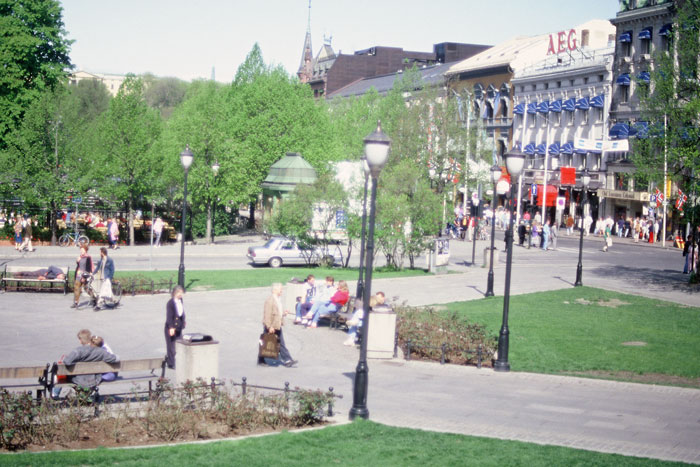
June 8, 1992
I rode the train for the first time yesterday and traveled to Richard Erskine's house west of town for dinner and swimming. The trip took about 25 minutes and was uneventful. The rails are welded so the train ride is smooth and quiet. Richard's house is all wood, inside and out and is located in a suburbanized forest area. His home is a custom home he had built three years ago; cost was about $200,000. Richard's wife is Norwegian and he's British. They have one young boy who will learn Norwegian in the home. English is taught in schools beginning in the fourth or fifth grade. Consequently almost everyone can understand my English, though sometimes they are reluctant to speak it.
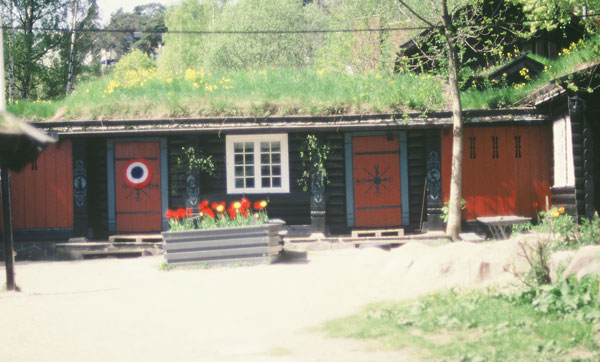 I worked in the apartment yesterday and finished my first draft of a net pay map for the U1 sand at West Varyegan Field. The map bears no similarities to the Russian version of the map, and I'm anxious to go planimeter my map to determine the reserves. Today is another Norwegian holiday, but I now have a “blue card” which will allow me to go into the Hydro building on weekends and holidays, plus stay late. On the average, I've worked six days a week on this job and will make plenty of money. Just now there's no talk of extending my stay. I can run circles around their geologists (most of whom are expatriates), so I suppose there's chance of an extension.
______________________________
I still am working on the White Nights project, and am focusing on the West Varyegan field. Interestingly enough, the OOIP in the U1 at WV is about the same as at KRAP. However, the average pay thickness is about half as much and the areal extent is about twice. I'm just beginning to study the Cretaceous sand and OOIP; there should be slightly more than in the Jurassic. All in all, I would not be surprised that the Tomsk fields were comparable to the WV fields, except they are being developed. Actually the other main field of the WV is Tagrinsk and it is over mature and would be a pain to take over. Lots of water production, over injection, lost reserves, many zones, over 400 wells, and a general nightmare. The final project review for Golden Mammoth is this Friday and they are tempting themselves to spend the 30 million dollars to sign up with Phibro. If it goes, there may be more work for me. So far I've been involved only peripherally in the project. Last night I read the AMOCO reports about their core and log studies of the Bakilov field (one on the Golden Mammoth fields). They did a huge project review. They didn't like the reservoir quality of the Jurassic/Cretaceous in the Western Siberia basin, and were not able to do much more than we could with the logs. I have a copy of the reports and you'll find them interesting. We have to remember that if the reservoir quality were good, the Russians would not need us. We need to draw from our experience; all those lessons we learned in the tight sands of the Rockies.
____________________________
June 15, 1992
Saturday I rode the train to Tonsburg along the southwest coast of Norway. I checked my bike as luggage then rode it back. I arrived there at 15:00 and immediately began the 120km ride back to Oslo. I had hoped there would be the same wonderful bike trails I have become accustomed to, but this was not the case. I rode part of the way along quiet roads meandering along the coast through cozy fishing towns. But after some 30 km of this, I was forced to take E18, the main highway to Oslo. The ride was very long and the traffic was bad. I find out now that bikes are not allowed on the freeway. When I finally reached Drammen, my butt was chafed and I was tired of riding. But there were still 40 km of road between me an Oslo. The road out of Drammen was quite steep and the weather was hot. I was pleased with my persistence in climbing the hill all the way to the top without resting, but before I could celebrate I saw the TUNNEL. I swore I never would ride a bike through a tunnel, but I had only one alternative which was to turn around and ride DOWN that long steep hot hill. But a TUNNEL?! I chose the center shaft as it seemed to have a wider area along the left side for me and the bike. It was a long tunnel and the noise of the traffic was horrid. Obviously I made it. I talked to myself as I spun through the tunnel: I hate tunnels; I hate traffic; I hate dark; here I am though, and it's dark, and it's noisy, and the air stinks of exhaust, and there are these random pot-holes in the road you cannot see in advance, and here comes another 18-wheeler, I hate tunnels.... I arrived at my apartment at 21:30 and was quite hungry. So I rinsed off and rode to a nearby open-air restaurant and had soup and beer. It's light until nearly midnight and the city never sleeps. My apartment is this one room place with only one window which views another high-rise apartment a short distance away. There's this young couple in one of the apartments who do not have curtains on their bedroom window and do not seem to know it. Every morning and night they do the most incredible things for the longest time; I admire their stamina. The weather has been very hot and I like to sit by the window, but I sometimes feel like a peeping tom. I suppose if they didn't want the world to see, they would be more discrete.
June 21, 1992
Today I took the “bike train” to Stryken at 9:30AM along with at least 300 other trekkers. Three boxcars were loaded with bikes and four passenger cars carried the weekend warriors. Stryken is located some 30 kilometers north of town in the forest. The bike trail system is quite amazing with seemingly endless gravel roads restricted to motorized vehicles. Beautiful lakes are everywhere and the bike trails are rich with enthusiastic cyclists. Young and old, entire families or individuals like me, the mountains were crawling with bikes. I managed to make it home in about 4.5 hours after taking the long scenic way back. I showered and grabbed a bite and headed to Hydro go get in a half-day's work. Now I do not feel so bad about the shopping spree on Thursday.
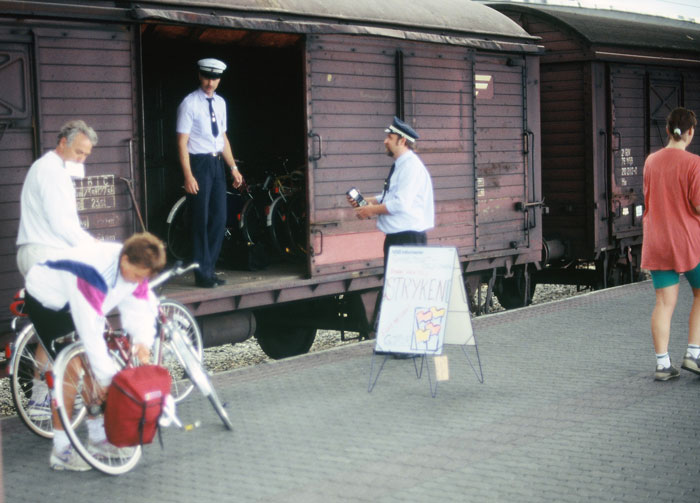
I sold my bike yesterday to a father and teenage daughter. The bike cost me about 5300 kroner, and I sold it one month later for 2700 kroner: a net loss of 2600 kroner. But part of the terms of the sale are that I keep the bike until next Friday. I've put many kilometers on the bike and it's starting show signs of wear. For example, the rear tire is warn bald and the headset is loose. I'm very happy that I do not need to hassle taking it back to the States. Besides, I need the money to offset some of the shopping spree. I brought this computer home to the apartment tonight so that I could start typing my report. Now that I'm here I'm thinking maybe I can live with the secretary’s typing. She has no imagination regarding format and font, and cannot spell very well in English, but I'm thinking now that Hydro could probably live with all of that. I know, I'll have her type it and I'll get a copy in ASCII and make it look nice. Yes, of course, that's a good plan.
June 27, 1992
Svein invited Mike and I to dinner at 19:00 at the Theater Cafe. Dinner was fantastic and Eirik joined us. We drank plenty of beer and, before we were finished, spent more than 2,000 kroner. I had a good time and was ready to head home when Svein told me we were now going to a bar for a drink. In the end, we went to five bars and had way too many drinks. I knew I was in trouble when I noticed through a bar room window that it was getting light. Admittedly, the sun rises early at 60-degrees latitude, but the time was after 3:00AM. I was home at 4:00 and did not wake up until 9:00, getting to work at 10:00. I felt like shit and was not really up to fine-tuning my report and archiving all of the data. I skipped lunch because my stomach was fussing at me. In the afternoon, I felt better and wrapped up the entire project before leaving for the day. I sold my bike for 2700 kroner, half of what I had paid for it five weeks earlier. It was a good deal for the buyer, but frankly, the bike had more ware than its short life would have you suspect. I thought the bike was overpriced when I bought it and I came to find out that Norway has steep tariff for bikes to encourage people to buy DBS bikes which are made in Norway. I was ready to travel back to the States. Tor Martin invited me to go look for Paleozoic fossils since I'd been pestering him about fossil hunting for a month. He drove me to a locality along the fjord southwest of Oslo about an hour away. We found many cyphlopods and crynoids in Silurian/Ordovician limestones, then several trilobites and the Ordovician. The high point of the trip was to see the Precambrian/Cambrian contact. It was a gentle angular unconformity and the exposure was excellent. Tor tells me that this location is world famous and perhaps the only such exposure. The location was very remote, but had an official Norwegian sign on it instructing observers not to use hammers or take samples. I have trouble understanding Tor Martin most of the time because he in incredibly introverted and because his English is not good. But he's a wonderful person and a good geologist, so we got along well. On this excursion, I had no idea what our itinerary was to be. After looking for fossils, we got back onto the main road and I thought we were heading back to Oslo. Instead he took me to his house in the mountains where his wife had cooked a delicious salmon dinner. So we sat on the veranda enjoying the peaceful view, drinking beer, eating salmon, and strawberries. The sun finally went down at 22:15 and we went into the house at 23:00. I asked if perhaps we should drive back to my hotel in Oslo, and received no response. I ask again 30 minutes later. This time I learned that both Tor Martin and his wife had consumed one beer two hours earlier and could not drive in fear of losing their license. They invited me to spend the night which I did. I slept better last night than any night since leaving Golden. Their house was cool and very comfortable. The view of the forest from the hillside was a pleasant change the apartment building across from mine where the young couple probably still were intimately in bed. I slept in their 12-year-old son's room who was staying with his grandmother. The walls were covered with posters of skateboards and RC cars. He had a nice keyboard and skids and all sorts of other boyhood treasures. I wish he'd been there. This morning we drove back to Oslo and I packed my bags. What a job. Where did all of this stuff come from? I already have shipped back four boxes of stuff and have sold my bike so that this trip would not be too burdensome. But there still was too much. I had to make three trips from Triangle Apartment to SAS Hotel to carry all of my stuff to the SAS check-in counter at the hotel. Then I was informed that my ticket was wrong and they could not check the baggage. I freaked. I poured my heart out to the poor young gal at the counter and she severely bent the rules and checked the baggage. Phew! What a relief that was to have them assume the responsibility of these very heavy bags. By then I’d missed the bus to the airport and had to take a taxi. The man at the ticket counter informed me I could not fix my ticket on a Saturday since United Airline's approval was needed and they were closed on Saturday. We discussed the “problem” for several minutes, but to no avail. Finally I challenged him by saying, “Now we understand the problem; what is your solution to the problem?” He muttered over his computer for 20 minutes and finally told me I was due a 260-dollar refund for flying SAS rather than United. I was very late now and the plane was to take off in 25 minutes. I still needed to go to the customs Tax Free office to obtain my refund of Norwegian sales tax. The total refund was over 600 kroner, so it was worth some hassle. I managed to find the Tax Free refund counter and there were 30 bustling little Japanese tourists there in a buying frenzy. I managed to make the refund on all but one of the claim forms and caught this plane. Just now we are approaching Iceland and I've finished a Ringnes beer. I'm very anxious to get home. I'm certain I'll get future work from Hydro because they genuinely liked my work and personality. I asked Mike Adams (Adams, Pearson, and Associates (APA), Calgary) if he thought he might need a geologist to help him with future projects and he seemed interested. I got along well with Mike and felt we worked well together. If I were to work with him, it wouldn't be through Questa. I wonder from where my next dollar will come.
Postscript: Norsk Hydro paid promptly, but two years later the Norwegian tax department sent me an income tax claim for 50% of my earnings as though I was a Norwegian citizen. Thus I was being double taxed on my earnings since I already paid US taxes on the money. I filed a formal protest with the IRS and they accepted my case and negotiated in my behalf for a year before caving in. In the end, I had to pay an additional $5,000 of my hard-earned money to Norway; it's never easy. I departed Denver at 08:40 on 5/20/93 and arrived in Aktau, Kazakhstan, at 11:00 on 5/22/93, traveling via Calgary, Frankfurt, and Moscow. The trip took a total of 50.5 hours real time and crossed 12 time zones. The longest delay occurred in Moscow where Aeroflot delayed departure from 23:55 to 07:00 the next morning.
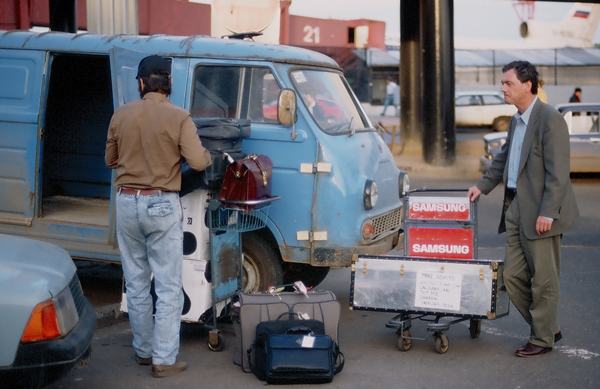 Mike Adams loading gear into taxi.
Sleeping in the Moscow Nucoma airport sucks. It was not until 01:00 that the airline let us know the flight was delayed until the next morning, which was too late to try to find accommodations for the night. Besides, we were carrying a total of eight parcels between Mike Adams and I, one of which tipped the scales at 70 kilograms! Thus we were chained for the night to this albatross of oversized baggage in a city well known for theft. The “benches” were crowded and ragged and the night was long and cold. All the night we worried about being mugged or some of the baggage being stolen in our sleep, so we slept spread-eagle over our goods with one eye open. Aeroflot amazed us and departed on schedule in the morning, and we managed to check in all of the baggage. The 70-kilogram sea chest created a bit of a problem and required a 10,000-ruble personal bribe to the baggage handler plus a $35 excess baggage fee. We actually were fortunate because the excess baggage fee should have been $155 more, but our interpreter (who arrived at the airport at 06:40 with my reading glasses which I had inadvertently left in his van during the move from the international airport to the domestic airport the day before) haggled with the agent who in the end allowed us to pay in rubles rather than dollars, savings us lots of money. We gave the interpreter $20 for the special trip to the airport to bring my glasses, and another $10 for helping us save $155: he was pleased. The exchange rate is a moving target, but now is 980 rubles per dollar. A month ago when Russ returned from Moscow, it was 700 rubles per dollar. It was 235 rubles per dollar 6/92, 190 per dollar 1/91, and 135 per dollar 10/91. We bought $100 worth of rubles in Moscow and now need to exchange several hundred dollars more in Aktau when the bank opens. We are carrying too much money for this part of the world (or anywhere). I'm carrying $4,600 and Mike is carrying about $5,000. Plastic does not work here, so cash is necessary. With all of our cash and goods (three computers, a copy machine, monitor, and abundant support equipment), we are easy and lucrative targets. But now we're out of Moscow and have arrived in Aktau, so the risk of foul pay is nil. Today is Sunday and we have nothing planned for the day except resetting our jet-lagged bio-clocks. Yesterday we walked about the city with the interpreters and got our bearings. It's a lovely city, MUCH nicer than my expectations. I've heard so many scare stories about the ecological disasters in Kazakhstan, that I've brought my own food and a water pump to sterilize the water. I had images a destitute Kazakhs with birth deformities. I was pleased to find the Kazakhs happy, healthy, and well dressed. They like colorful clothing very similar to the US. I suppose the goods are coming from China. People in Russia do not dress nearly so nice. At dinner, I drank Macobee beer, imported from Israel. The food seems OK; the restaurant was nice by most standards, lots of colorful cut flowers everywhere, nice music: it does not feel anything like Siberia. I spent the night at the Aktau Hotel which cost 8,000 rubles per room (about $8). The rooms are nice and clean and quite similar to the rooms I stayed in Tomsk and in Ukhta. Mike is set on moving to a nicer hotel (the “Oilman's”, or Entourist Hotel) located on the shore of the Caspian Sea, but the hotel now is full. It would cost us $90 per night for a room with two bedrooms. It really is quite nice, complete with doilies, nice furniture, wallpaper, tables, refrigerator, and more. The Caspian view is fantastic.
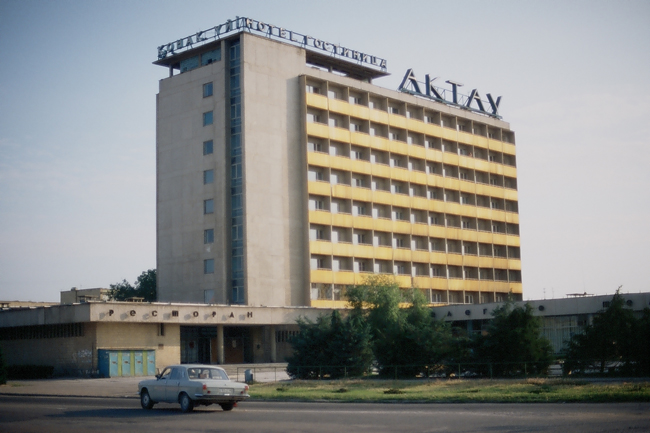
I sit here this morning trying to figure out what time it is. I went to bed at 15:00 yesterday and, except for the seemingly never-ending game of beer-can soccer outside my window at sunset, slept through to 04:00 the next morning. Well, I think that's the time. According to my watch, that's the time. However, according to this computer, I woke up at 00:15, and according to my HP calculator, it's 04:15. It seems that this computer clock has lost some time, perhaps due to relativity. I suppose I believe my HP more than anything. The fact that we have traveled through 12 time zones helps resolve the real time: it's the same as at home, plus 12 hours. I haven't yet figured out the phone system, but will do so this morning. I hope to call home and let everyone know the trip was relatively uneventful and I've arrived safely in Aktau. Oh, the climate and terrain.... The countryside looks just like the Mohave desert or the Bakersfield area. No trees, but rich growth of sagebrush and the like. Camels, sheep, and cattle graze the steppes that are relatively flat with small hills. The roads are in acceptable condition, especially in town. The buildings are constructed from locally quarried limestone: some pink and very fossiliferous. Most structures are tan or adobe in color and moderately well-constructed with craftsmanship better than in most of Russia. A statue of Lenin is erected across the street from the Aktau Hotel in front of the former Communist Party building. The building now houses the same people, but they wear new hats. Somehow I suspect they still are communists.
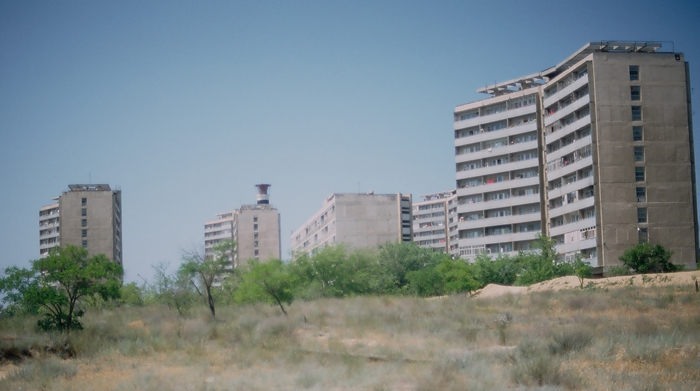
Sunday now is behind me and I have a few thoughts as I head to bed. I understand there are three water supplies for Aktau: 1) the “technical” cold water in the taps, 2) the hot water in the taps, and 3) the drinking water down the hall. As there is no fresh water in the region, all water comes from the desalination plant, which desalinates brackish water from the Caspian Sea. The drinking water tap in the Aktau Hotel is located down the hall from this room and is a common water supply for the floor. This water allegedly is “filtered” from the cold water supply. The hot water is only on at certain times of the day, I believe in the morning and in the evening. It's the cooling water from the nuclear power plant located about five kilometers south of Aktau. Both the cold and hot water in the taps comes in many assorted colors that change as its drawn from the tap. I decided today that I'll use the water sterilization pump I recently bought. Now I have a bladder of filtered water hanging on my wall which is treated and pumped “drinking water” from the hotel. I also decided that I'll drink beer on this trip and disregard my practice of only drinking beer on the weekends. The beer is imported from Israel and likely much better for me than the local water, even after treatment. Looking again at the city of Aktau, it seems this is a model ‘nuclear city’, Russian style, and I've nicknamed it “Atomic City”. With a nuclear power plant only five kilometers from the city center supplying endless power, an adjacent desalination plant providing abundant potable water in the middle of the desert from the brackish Caspian Sea, a plutonium enrichment plant next to the power plant, and a uranium mine just a few miles away, one cannot deny the efficiency of design. All this and a grand statue of Lenin in the middle of town: this is ‘Russia on the Move’. The entire city was built only 35 years ago in the late 1950's. This pre-dates the discovery of the Uzen Field, a supper giant oil field that ultimately will produce more than two billion barrels of oil. This oil is shipped to Eastern Bloc countries via the Friendship Pipeline (on the north side of the Caspian Sea). There is something mysterious about the very existence of this city I hope to sort out before leaving. [This is discovered and discussed below.] There are many rather gaudy construction projects in the city to add to its glamour, like the huge double fountains in front of the Kazakhstan Restaurant that now are overgrown with shrubbery and not functioning. There are many unfinished civic construction projects and it looks as though there was a sudden budget cut. There are high-rise apartment buildings located near the Caspian, all facing to the west for the view. The botanical gardens were fenced and many plants put into the ground before the Russians realized the ground was too saline to grow exotic plants. Now the gardens include only the few surviving imports plus sagebrush and weeds. We had dinner tonight with the Chief Geologist (Eugene Ogay) from the Research Institute (Kaznipneft). For the third time since arriving, we ate at the Kazakhstan Restaurant. The menu is quite limited and I already don't like it, though the atmosphere is good. The chicken is like rubber, the beef like leather, and there's no other choices (except the catfish, which are caught locally in the Caspian Sea near the sewer outlets where they thrive). I met our new Kazakh interpreter tonight who speaks perfect English. He is a friend of the Chief Geologist and is only 26 years old. He knows much more about western pop music than I ever did; he also knows many American jokes, customs, idioms, etc., and wears a USA stars-and-stripes T-shirt. One must consider the possibility he’s KGB trained. I'll give him one of the Frisbees I brought for gifts. Eugene Ogay was diagnosed with cancer a few months ago and very recently had surgery. Gordon Mitchell tells me that Eugene gained 16 pounds since surgery and is optimistic he'll recuperate, but he looks very frail to me. Both of Eugene's parents died of cancer in their 40's. Eugene is Korean and immigrated to Aktau, but now holds a prominent government position. There are four Canadians staying at the Aktau Hotel with us. They work for Processes Unlimited and Cana-Kaz and are involved with refurbishing some of the wells in the Uzen Field. They have a completion rig being shipped here by air which they'll use to pull tubing, remove fish from holes, pull pumps, and reinstall new pumps deeper in the holes. Pumps now are placed at about 700 meters, far above the 1500 to 1800 meter perforations. Dropping the pumps will greatly help the declining production. Gordon Mitchell tells me there are one or two fish in most holes, the casing and tubing are rotten, the pumps are without seals and in poor condition, and there are no packers. Gordon’s associates include Glenn Ducaukus, Duane Dudics, and Philip. Philip is a native Russian who migrated to Canada in 1971, and serves a double function as an engineer and translator.
May 24, 1993
We are asking for help moving from the Aktau Hotel to the Entourist Hotel and it seems likely they'll assist us. It seems Mangyshlak owns the hotel and decides who may stay there.
May 26, 1993
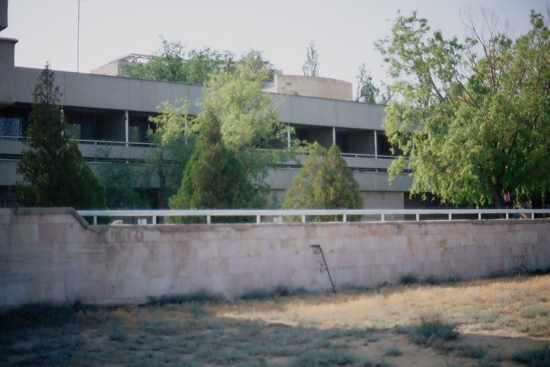 Backside of Oilman's Hotel, Aktau.
A good thing about the Aktau Hotel was that there were few mosquitoes. There are a lot of mosquitoes here at the Oilman's! I woke up during the night at least six times on mosquito ‘search and destroy’ missions. The easy ones to kill were those who recently had eaten (me). They fly much slower than the hungry mosquitoes and make easy targets. There is a certain satisfaction when you hit one and put a splat of red on the wall in memory of the fallen vampire. The empty mosquitoes are more of a challenge. Where they hide is a mystery to me. Many cling in traditional locations on the walls and ceiling, and they are relatively easy to kill with a damp towel. Having killed the obvious mosquitoes, it's necessary to lie down with the light off for about five minutes to lure the more clever mosquitoes from hiding. They'll begin buzzing my ears after only a couple minutes when I pretend to be sleeping. When I get up and turn on the light, there are one to four of the bloodsuckers on the wall adjacent to my bed, perched and ready for their evening meal. So I kill them and lie down again to lure in the next wave of mosquitoes. This goes on for about an hour and I finally go to sleep. I wake up again in about two hours and sweep the room again, killing first the slow mosquitoes who recently have eaten, then playing the sleeping game a few more times. I'm glad I don't swell from mosquito bites. These creatures are very large compared to mosquitoes I've seen elsewhere in Russia and America. In the morning, the room is a blood bath. The second night was as the first, with the morning death toll at 14 and the walls crimson red. I decided to change my strategy since there must be an unknown access to the room used by the mosquitoes during the night. I suspect the ventilation system is the source of the night-traveling mosquitoes; perhaps it's the void above the false ceiling at the entry to the room. Regardless, they're coming from somewhere and it doesn't seem to matter how many I kill, they still suck my blood in my sleep. So I've upped the ante and gone to chemical warfare. Mike brought with him mosquito coils and sprays and I've borrowed some. I sealed off the air conditioner with plastic and hung a blanket between the bedroom and the hallway where I suspect they're entering through the false ceiling, and it seems to help. The smell of the burning mosquito coil is a bummer (I think they're meant for outdoor use only). Last night was much better though. I didn't wake up a single time and only see three new bites on my arms. The nuclear power plant is located only five kilometers from town. Current Russian regulations require nuclear power plants be built no closer than 30 kilometers to towns, but this plant pre-dates such regulations. Alexander Tsyplenkov, our interpreter and former geophysicist, is very concerned about the quality of water in Aktau. He lived here between 1968 and 1973 with a four-year break to live in Armenia. He's an intelligent man with a science background, so his concerns regarding water quality are not to be taken lightly. He observes the very poor condition of the teeth of people living in Aktau. Gold caps are very common for front teeth, even with teenagers. Bottled water is not available here. I bought a case of beer and I pump drinking water daily with the sterilization pump, however there's a limit to how careful one can be. Tea at the Institute, tea and reconstituted juice for breakfast, and so on: you cannot filter it all. The water is nice and hot in the Oilman's showers, but the hot water comes from the nuclear reactor. So do I irradiate myself in the morning before work, or do I take a cold shower? I have irradiated myself twice so far. This morning I decided to take a cool shower (as opposed to a cold shower), thus reducing the radiation by 75% since only the HOT water is coming from the reactor. One of the new engineers with Colt didn't believe me when I told him the source of the hot water. I had him ride with me and our driver and follow the large aluminum clad pipe in front of the hotel through town and into the countryside as it progressively branched and became larger. There were places along the way the aluminum cladding had peeled away and the fiberglass insulation behind it was exposed. By the time we arrived at the nuclear power plant, the pipe was about eight feet in diameter, and my engineering colleague was a believer. It's evening now and I'll finish catching up on the past few days. The Uzen field is a monster with 5600 wells and a cumulative production of nearly two billion barrels of oil. The data is accumulating quickly and soon I must stop gathering data and start analyzing it. This is by far the largest field I've studied. The Russians did a magnificent job on their 1965 certification report of the field: much better than I've seen on smaller fields in Siberia. Tonight I'll compare net pay counts used by the Russians with my own counts on a few wells to validate their work. It now appears they were conservative and that the original oil-in-place will increase. I suspect however that the recovery factor we use will be lower than that used the Russians, so the overall recoverable reserves will stay about the same.
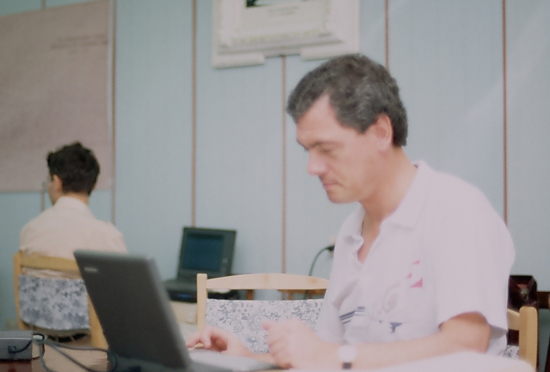 Mike Adams inputting data in computer. I've learned more about the origin of Aktau, formerly Shevshinko. It was founded in about 1957 as a result of the discovery of a large uranium deposit nearby. The town was owned by the Soviet uranium company and built with the labor of political prisoners. The existence of the town was top secret and it appeared on no maps. It was something of a model “Atomic City” with its own nuclear reactor and uranium mine. The plan was grandiose, complete with large courtyards for parades, long lines of flagpoles, a huge statue of Lenin, parks, view apartments, and HOT water. The prisoners worked the open pit uranium mines and would not live long. I was told political prisoners could reduce their 20-year sentence of hard labor in Siberia to 3-years in Shevshinko mines; they weren't told they would have only five years left to live. The city is a bit tattered now and in need of repair.
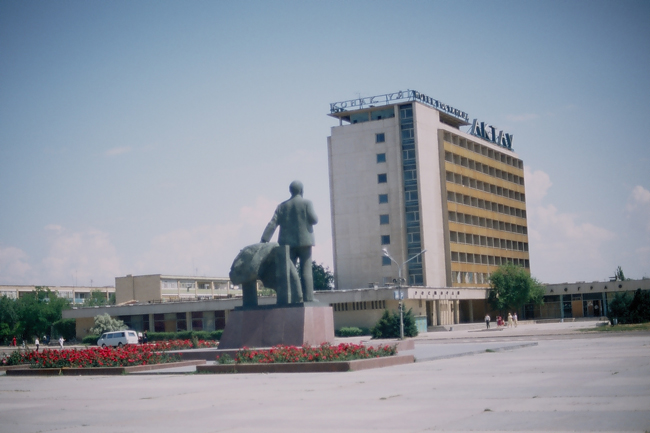
May 27, 1993
I'll need to change money again before the weekend. Money changing is an interesting process here. The banks have poor rates, so we have been changing money with a Korean piano tuner named Valarie. His going rate now is 1000 rubles per dollar, compared with 980 rubles per dollar at the bank. The Korean also sells me caviar for 5,000 rubles per half kilogram. He's a very nice man and has poor vision. He lives in the music school and earns $34 per month tuning pianos. He was shocked to hear that we are paying $50 each per night at the Oilman's Hotel. I saw the Korean on the street while walking back to the Oilman's from Mangyshlak (a brisk 15-minute walk). He was pleased to see me in this setting and grabbed my heavy brief case and carried it for me to the Aktau Hotel where I was to meet with Gordon Mitchell. It's nice to see a familiar face in an unfamiliar city. Gordon was having trouble loading the Microsoft game pack I let him use two days earlier and ask for my help. First I scanned his computer for virus and sure enough, he had “form” virus. This is a bad one and cleaning it will destroy much data. I suggested he print out anything worthwhile before I clean the virus. I ran into “fst” virus on Andrea Ivanov's computer the second day we were here. I shall scan every computer before exchanging data. I hope to mail this letter today, although I surely will arrive home before the letter. But I'll feel as though I'm talking with all of you as I hand this letter to the postal clerk. I bought envelopes yesterday and mailed you a short note. I bought six international envelopes with postage, and the clerk almost could not change a 5,000-ruble note ($5). They had never seen a US dollar before, so I made a spectacle of myself and showed them one. It drew a crowd in the post office. The international phone lines still are down and there's no indication when they'll be functioning again.
May 29, 1993
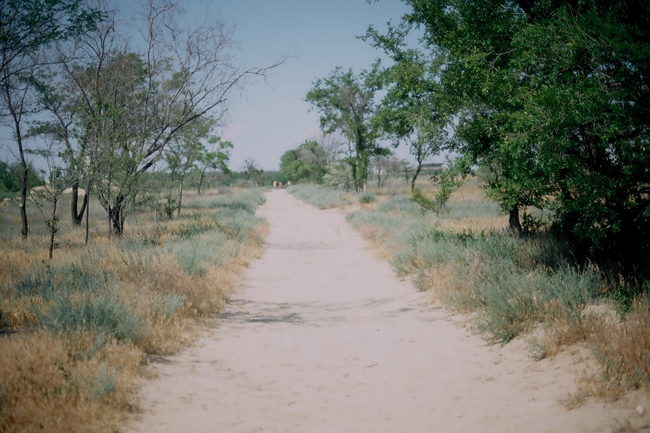
Trail along Caspian Sea. Today we sat with Alexander and read the 1976 and 1979 certification reports by the Russians for the Uzen field. I'm impressed at the quality of the geological work for this field. It's amazing that the Russians discovered the field in 1961, and by 1965 had drilled and evaluated 69 wells and synthesized the voluminous report. Quite amazing. The field has about a 1000-foot oil column over about 100 square miles, and has about eight billion barrels of original-oil-in-place (OOIP). I expect this is a conservative estimate for several reasons. The Russians do not appear to have credited the “siltstone” for any of the oil-in-place, yet I observe core analyses indicating much of it has acceptable reservoir properties. Second, the oil saturation used appears too low. Third, there appear to be many sands not included in the net pay counts. This all has to be weighed against a recovery factor that was perhaps too high. It's premature to try to see the answer to this huge problem now, but I suppose we will find their OOIP is too low and that the recovery factor is too high, and that their request for a loan from the World Bank is justified based on remaining reserves. Mike and I walked to the shore of the Caspian Sea to check out the sailboats being rented there. Tomorrow we hope to finish work by noon, then go to the Caspian. They rent small Laser sail boats and we would rent two boats for a half-day and explore the coast. It always is difficult negotiating when you don't speak the language, but in the end it seemed we could rent the boats for a total of 30,000 rubles, or $30. We negotiated this down from 40,000 rubles and were feeling quite clever as we turned to walk away. As we walked along the trail, we overheard the two boys with whom we were negotiating let go a joyous hoot at their successful and profitable negotiations. I turned to Mike and said I thought perhaps we had been taken. He calmly answered, “we're not talking about much money here, are we”. Today at lunch, we went to the Saturday bazaar for a walk-about. It was quite crowded with common folks shopping for bargains. I managed to find a few things to buy and hope you will enjoy them. I never felt at risk in this very crowded place. Tonight we are to meet Gordon for dinner. Gordon is obviously lonely and takes every opportunity to stop by the Institute to say hello. He's the epitome of an aging expatriate who’s seen so much all over the world, but sits alone in his small Aktau apartment waiting for something to happen, and drinking. Games on his virus-ridden computer are one of his few pleasures.
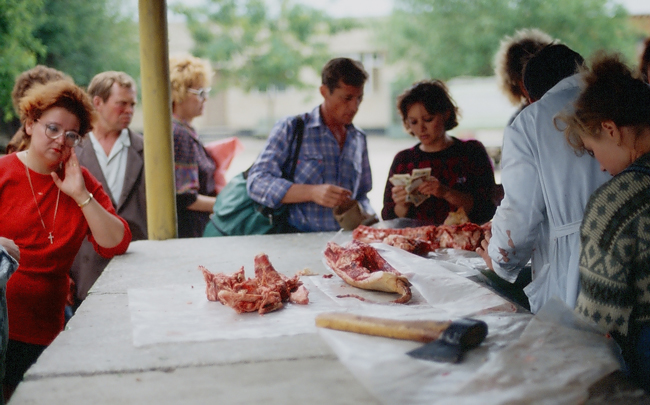 Saturday Flea Market; anyone want some fresh meat?
June 1, 1993
The mosquito forecast calls for moderate to heavy activity for the next two days. Reasons for the increased activity are several fold, and include high humidity, hot weather, light winds blowing off the Jetiby Steppes, and only a 60% occupancy rate at the Oilman's. (New arrivals are not warned of the increased hazard so that they'll pay their dues and feed the hungry mosquitoes before the bloodsuckers try my room again.) Consensus among the Entourist guests is that last night was the worst. It's recommended to keep all doors and windows closed, seal the air conditioner with plastic to prevent penetration through the small cracks, burn mosquito repellant strips every two hours, patrol rooms every hour before going to sleep and every three hours after retiring, or more often if the infection is acute. All of today will be spent picking net pay thicknesses off well logs. I must finish by tonight, so it'll be a long tedious day. It's evening now and I'm only two-thirds finished with picking net pays. I have 10 wells here in the hotel to complete before cashing in for the evening. The Korean just left a few minutes ago with a friend of his who sold me some old Russian coins. They all are silver; some are pre-revolution and some post-revolution. I think I got them for a fair price, but who knows. I gave Albert Enikeev a Frisbee the other day and he hasn't stopped playing with it since! Albert lives in Moscow and is about 30 years old. I'm not sure what he does since his card simply says “Expert” working for Nichimen Corporation. I've enjoyed his company and expect I'll keep in contact with him for many years. These Frisbees have been a real hit. I gave one to Adine the Kazakh, one to the Russian kids who play by the sailboat rental dock, and one to Albert. After sailing for a couple hours Sunday afternoon, I took a Frisbee down to the dock for the kids. They love it. The owner of the boats took us out on the Caspian for a short boat ride in his black metal runabout. Several of the high school kids jumped in and joined us for a ride. We went about a mile up the coast and stopped: I was the first one in the water, then everyone followed. Two of the people along were Russian engineers who speak fair English, then there was John the Brit, the Russian kids, and me.
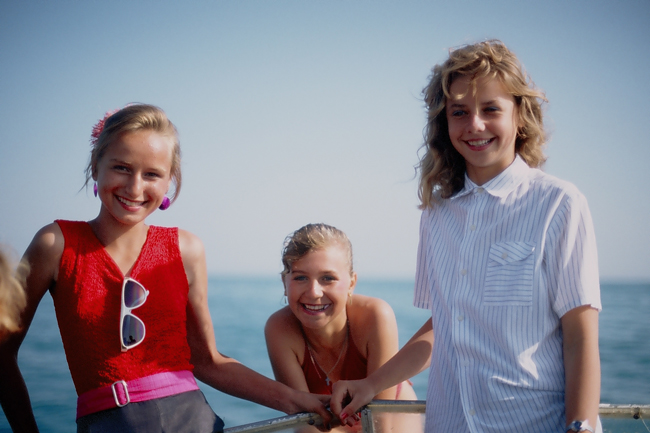 Three of the kids who took a boat ride with us on the Caspian. After completing the coin transaction, I joined Albert and John throwing the Frisbee along the sea cliff. The locals have never seen a Frisbee before, so we always draw a crowd.
June 3, 1993
Mike returned late last night from the Uzen Field and had a successful trip. He brought back 200 well logs from Blocks XVIII and IIIa for me to review and copy. In addition, he determined several problems with the methodology used to calculate the volume of injection water (it was thought to be 1.8 times production, but now is surely less than 1.4 times production), found where the fluid properties data is kept and made arrangements to copy some of it, made arrangements to obtain some core samples, and visited the field to gain an appreciation of the condition of the surface and surface facilities (a complete disaster).
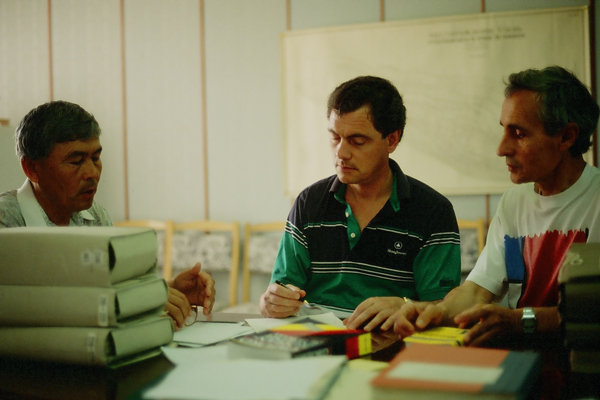 Mike Adams and Alexander, our translator.
June 5, 1993
This morning my “inner man” (as they say in Russia) was not happy. He suffered from too much Chinese the night before. But we were up at 7:00AM and to the office by 9:00AM, and suffering for the next two hours while my “inner man” healed. The day turned out to be quite productive and most of the rout work of data input and copying now is complete. The production data is nearly completed, most well logs are copied, core data is input into the computer, and the field studies are copied. We depart for Moscow and home on Thursday the 10th, which gives us ample time to finish without a panic. Tonight we joined Alexander and Anatoli for dinner at their friend's house. The folks were most gracious and hosted a fantastic meal. There were 12 adults and two kids present and dinner lasted from 7:00PM till after midnight. They remarked that a dinner such as this one was unimaginable two years ago, and was the first such social gathering they have had with an American and a Canadian. Two of the men present work at the nuclear power plant as designers and helped to build it 25 years ago. It used to be called Gor'yev 20 and it was built by the Soviet Union military. The uranium mined from the area is high density plutonium used for bombs and the city never was shown on maps. Everything here was once top secret, and there still are carry-overs of the cold war mentality. And now we sit and dine with nuclear technicians and reflect back on the cold war years with a shudder. Alexander worked for 46 days at Chernobyl after the disaster. He was given a gas mask and a radioactivity badge as his only protections against radiation. He added up the exposure counts daily, but when his work was complete, the official exposure count given to him was half the real number which he calculated. Thus far he feels no effects from the exposure. Alexander II (there were three Alexanders at dinner) ask if we would please bring medications back with us for their dear friend's six-year-old daughter who was diagnosed with leukemia. Their family lived near Chernobyl in 1986 when the disaster occurred: the girl is a victim of the incident. The girl was taken to Moscow for treatment, but now lives in Aktau since Moscow ran out of medications. We said we would bring medication if a medication exists, but we doubt the existence of medication that cures leukemia. I told them the story about my friend Dr. Leonid Smirnoff who recently died of leukemia many years after doing field work in a radioactive area in the Urals. As Russians in Kazakhstan, their future is unsettled. They rhetorically ask themselves whether they should join the “great Russian migration” and go back to Russia. This group all arrived in Aktau more than 20 years ago and have born and raised their children here. When I first asked about their place in the new Kazakh social structure, they said they did not intend to learn Kazakh and that this was their home. They see their technical skills at the reactor as critical and see no suitable Kazakh to take their place. Therefore they feel there is relative harmony between the Russians and the Kazakhs in Aktau. The Russian-Kazakh relations have deteriorated in many places in Kazakhstan. Later in the evening, one of the men ask my thoughts regarding staying in Kazakhstan or returning to Russia, and about the difficult times they are having in this 'never-never land' between socialism and capitalism. It's my opinion that it will be a generation before the transition to capitalism and democracy is complete, if things go well. Kazakhstan has rich natural resources, so it should be possible to become a prosperous society. I said, “It's the children in the room who hold the answers to the future of the country. It's paramount to groom them well and provide them with proper education in order for them to have the wisdom and skills to perform the difficult tasks that lie ahead.” I'll give Alexander a $20 bill to give to Alexy's parents as the beginning of his education fund. (Alexy is 15 years old and helped us for several days inputting data and general copying; the kid is very sharp.) I do not think the money is as important as the statement regarding how critical the education of the children is to the growth of the country. The $1 bill we gave Alexy for helping input data now is signed by Mike and is framed on Alexy's wall. Alexy's father tells us that he got this idea from the Scrooge story when Scrooge framed his first dollar. I told them this is common practice in America. In the short term, there are two major construction projects on the boards for the Aktau region. First, the Japanese have entered into a joint venture to build a refinery in the area. Second, the nuclear power plant is getting old and a new one must be constructed soon. They hope to build it with joint-venture capital. It was not clear who was investing, but part of the deal (as I understood it) calls for foreign nuclear waste to be stored on Kazakh soil. Large construction projects will be far more difficult now than under the Soviet Union because of the lack of suitable labor. When Moscow wanted a nuclear power plant, they simply sent a few thousand workers with materials and built the plant. Now Kazakhstan must do this with their limited resources.
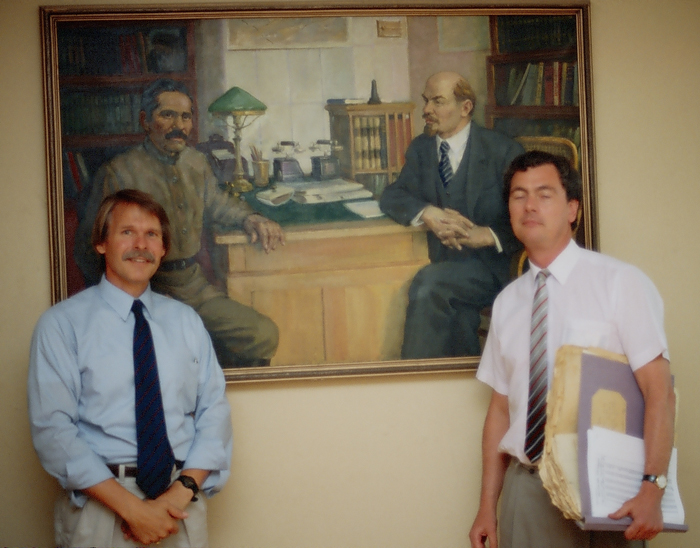 Bill Connelly and Mike Adams with portrait of communist leaders.
June 8, 1993
I met a man today named Patrick who works for Diawaw and is negotiating the joint venture with the Kazakhs to build a refinery 70 kilometers south of here. I hope to meet him at breakfast and learn more about the project. He contacted me because he's looking for a supplier of caviar and heard I have one. I have 1.5 kilograms of caviar in the freezer to take home.
June 10, 1993
The personnel carrier took us to the “ordinary” terminal rather than the Entourist terminal since the flight was almost exclusively Russians and Kazakhs. It was raining and cold and people were pushing in a normal Russian manner. Alexander's son was supposed to greet us at the terminal entrance, but we saw no sign reading “Mike Adams”. I arrived in the first personnel carrier and Mike arrived in the second. As I searched for Alexander's son, I immediately attracted a swarm of Gypsy children begging for money. Their routines were endless. First the hungry forlorn child, then the religious kids, and so on. Some had cloth wrapped around their hands as though they had injuries. None spoke English. They would not go away, but buzzed about us like mosquitoes, constantly changing their forlorn pleas for money. The terminal was dark, damp, and dingy. It had been raining in Moscow for several days and water was leaking through the roof and was being tracked in from travelers. It was very depressing. We could not figure out where the luggage was to arrive and walked about confused. Mike began to get irritated by the lack of Alexander's son and our inability to seek advice from the Russians. I left Mike with the carry-on baggage and went to the entourist terminal to see if our luggage was there. Along the way, I stumbled into Alexander's son who was running about with a sign saying “Mike Adams”. To make a long story short, we went back and forth twice between the entourist terminal and the ordinary peoples’ terminal looking for the baggage before deciding it would arrive at the ordinary terminal. An hour and a half later, the baggage finally showed up. The next task was to get the luggage and us to a taxi and try to change our travel arrangements to depart Moscow immediately rather than spending the night and depart on Friday. There was a good reason to depart sooner: our Visas expired on Thursday and we did not want to exit with expired Visas. But as Mike so eloquently put it, “let's get the fuck out of Russia today and go somewhere civilized”. This sounded good to me and London was the obvious first choice for a destination. So now we need a taxi. That means first locating a suitable vehicle that could carry all of our baggage. There's no shortage of “taxis” in Moscow Nucoma airport, but half were robbers and muggers, and all were small and run down. We drug our luggage back and forth twice on false calls and finally decided I should stay with the gear while Mike went to the entourist side of the terminal to find a larger taxi. It was raining and cold and the beggars would not leave me alone. The taxi drivers kept coming by with slightly larger vehicles, but I waited for Mike to return. Finally Mike showed up with a beautiful Mercedes Benz! I couldn't believe it. It was brand new, full sized, and the driver was a well-dressed young man. We piled in our gear and left Nucoma airport with smiles on our faces. Next challenge: find an airline ticket office to exchange our tickets and get the hell out of Russia. This took us all through the streets of central Moscow on many false tries. Finally we went to the Mez Hotel at the World Trade Center and found the British Airways ticket office. We changed Mike’s ticket first to depart Thursday afternoon for London, then depart Friday afternoon from London to Calgary. The added fee was about $700. Then for my ticket. I wanted to go from London directly to Denver, and my additional fee was to be $1100. This was rapidly turning into an expensive fling! I promptly asked the ticket agent how much additional it would be if I were to travel London to Denver on coach rather than business class. Fifteen minutes later, she answered that I would receive a credit. The decision was simple. I would get to see London for the first time and spend a night in the Free World if I chose to travel coach rather than business class for a few hours. When we landed in London, it was 2:00AM in Aktau, about 21 hours after we began this epoch trek. Local time, it was 9:00PM and we intended to see a bit of central London before cashing in for the evening. We checked into the Chelsea Hotel for 105 pounds per night (each), took showers to wash off the travel, took some pain drugs for our left legs, and rented a taxi to a nearby pub. We looked like a couple decrepit old men as we hobbled along looking for the right pub. My calf was swollen and sore from an injury I had several days earlier while throwing Frisbee with two Russians in Aktau, and Mike had gout in one of his toes. The day had been long and we spent hours in various terminal standing and waiting for luggage. Hours more were spent lugging our gear from terminals, hotels, and taxies. Two pubs later, it was 5:00AM Aktau time and we were exhausted. I went to bed and did not awake until 8:00 Friday. There were no mosquitoes, it was cool, and I slept great. I took a long hot shower, dried with a huge clean towel, had coffee in my room, and brushed my teeth with water from the faucet, unboiled. Now for the grand three-hour tour of London. Mike was born in England and went to college in London. He knew the city well and took me for a fantastic tour before our departure to North America. I cannot remember all the places he took me, but they included Westminster Abbey, St. Paul's Cathedral, Big Ben, the Parliament and House of Lords, Sosa district, China Town, Piccalilli Square, and the Red Light District. What a pleasure it was to tour with Mike! And London is a grand city rich in history and fabulous structures and art. Never have I seen such a spectacular place. It's a very busy city, but very interesting. I intend to return with the family someday.
And now it's Friday afternoon and I'm flying to Denver. The plane took off at 14:45 and arrives in Denver at 17:00 the same day, seven time zones away. That boils down to 8.25 hours in the air. This is 45 minutes ahead of schedule and I hope the family is there waiting for me.
|
